THE POTATO DEALER
By William Trevor
MULREAVY would marry her if they paid him, Ellie's uncle said: she couldn't bring a fatherless child into the world. He didn't care what was done nowadays; he didn't care what the fashion was; he wouldn't tol- erate the talk there'd be. `Mulreavy,' her uncle repeated. D'you know who I mean by Mulreavy?'
She hardly did. An image came into her mind of a big face that had a squareness about it, and black hair, and a cigarette butt adhering to the lower lip while a slow voice agreed or disagreed, and eyes that were small, and sharp as splinters. Mul- reavy was a potato dealer. Once a year he came to the farm, his old lorry rattling into the yard, then backed up to where the sacks stood ready for him. Sometimes he shook his head when he examined the potatoes, saying they were too small. He tried that on, Ellie's uncle maintained. Cagey, her uncle said.
`I'll tell you one thing, girl,' her uncle said when she found the strength to protest at what was being proposed. 'I'll tell you this: you can't stay here without there's something along lines like I'm saying. Nowadays is nothing, girl. There's still the talk.'
He was known locally as Mr Larrissey, rarely by his Christian name, which was Joseph. Ellie didn't call him 'Uncle Joseph', never had; 'Uncle' sometimes, though not often, for even in that there seemed to be. an intimacy that did not belong in their relationship. She thought of him as Mr Larrissey.
`It's one thing or the other, girl.'
Her mother — her uncle's sister didn't say anything. Her mother hadn't opened her mouth on the subject of Mul- reavy, but Ellie knew that she shared the sentiments that were being expressed, and would accept, in time, the solution that had been offered. She had let her mother down; she had embittered her; why should her mother care what happened now? All of it was a mess; in the kitchen of the farm- house her mother and her uncle were thinking the same thing.
Her uncle — a worn, tired man, not used to trouble like this — didn't forgive her and never would: so he had said, and Ellie knew it was true. Since the death of her father she and her mother had lived with him on the farm on suffrance, that was always in his eyes, even though her mother did all the cooking and the cleaning of the house, even though Ellie, since she was 11, had helped in summer in the fields, had collected and washed the eggs and nour- ished the pigs. Her uncle had never mar- ried; if she and her mother hadn't moved on to the farm in 1978, when Ellie was five, he'd still be on his own, managing as best he could.
`You have the choice, girl,' he said now, the repetition heavy in the farmhouse kitchen. He was set in his ways, Ellie's mother often said; lifelong bachelors some- times were.
He'd said at first — a fortnight ago — that his niece should get herself seen to, even though it was against religion. Her mother said no, but later wondered if it wasn't the only way out, the trip across the water that other girls had gone on, what else was there? They could go away and have it quietly done; they could be visiting the Galway cousins, no one would be the wiser. But Ellie, with what spirit was left in her, though she was in disgrace and crying, would not agree. In the fortnight that passed she many times, tearfully, repeated her resolve to let the child be born.
Loving the father, Ellie already loved the child. If they turned her out, if she had to walk the roads, or find work in Moyleglass or some other 'town, she would. But Ellie didn't want to do that; she didn't want to find herself penniless because it would endanger the birth. She would never do that was the decision she had privately reached the moment she was certain she was to have a child.
`Mulreavy,' her uncle said again.
`I know who he is.'
Her mother sat staring down at the lines of grain that years of scrubbing had raised on the surface of the kitchen table. Her mother had said everything she intended to say: disgrace, shame, a dirtiness occurring when people's backs were turned, all the thanks you get for what you give, for sacri- fices made. 'Who'd want you now?' her mother had asked her, more than once.
`Mind you, I'm not saying Mulreavy'll bite,' Ellie's uncle said. 'I'm not saying he'd take the thing on.'
Ellie didn't say anything. She left the kitchen and walked out into the yard, where the turkeys screeched and ran toward her, imagining she carried meal to scatter, as often she did. She passed them by, and let herself through the black iron gate that led to the sloping three-cornered field beyond the outbuildings, the worst two acres of her uncle's property. Ragweed and gorse grew in profusion, speckled rock- surfaces erupted. It was her favourite field, perhaps because she had always heard it cursed and as a child had felt sorry for it. 'Oh, now, that's nice!' the father of her unborn child said when she told him she felt sorry for the three-cornered field. It was then that he'd said he wished he'd known her as a child and made her describe herself as she had been.
When it was put to Mulreavy he pre- tended offence. He didn't expostulate, for that was not his way. But as if in melan- choly consideration of a personal affront he let the two ends of his mouth droop, as he sometimes did when he held a potato in his palm, shaking his head over its unsatis- factory size or shape. Ash from his cigarette dribbled down his shirt-front, the buttons of a fawn cardigan open because the day was warm, his shirt-collar open also and revealing a line of grime where it had been most closely in contact with the skin of his neck.
`Well, that's a quare one,' Mulreavy said, his simulated distaste slipping easily from him, replaced by an attempt at outraged humour.
`There's a fairish sum,' Mr Larrissey said, but didn't say what he had in mind and Mulreavy didn't ask. Nor did he ask who the father was. He said in a by-the-way voice that he was going out with a woman from Ballina who'd come to live in Moyle- glass, a dressmaker's assistant; but the information was ignored.
`I only thought it was something would interest you,' Mr Larrissey said.
Their two vehicles were drawn up on the road, a rusting Ford Cortina and Mul- reavy's lorry, the driving-side windows of both wound down. Mulreavy offered a cigarette. Mr Larrissey took it. As if about to drive away, he had put his hand on the gear when he said he'd only thought the proposition might be of interest.
`What's the sum?' Mulreavy asked when the cigarettes were lit, and a horn hooted because the vehicles were blocking the road. Neither man took any notice: they were of the neighbourhood, local people, the road was more theirs than strangers'.
When the extent of the money offered was revealed Mulreavy knew better than to react, favourably or otherwise. It would be necessary to give the matter thought, he said, and further considerations were put to him, so that at leisure he could dwell on those also.
]lie's mother knew how it was, and how it would be: her brother would profit from the episode. The payment would be made by her: the accumulated pension, the compensation from the time of the acci- dent in 1978. Her brother saw something for himself in the arrangement he hoped for with the potato dealer; the moment he had mentioned Mulreavy's name he'd been
Ef aware of a profit to be made. Recognising at first, as she had herself, only shame and folly in the fact that his niece was pregnant, he had none the less explored the situation meticulously; that was his way. She had long been aware of her brother's hope that one day Ellie would marry some suitable young fellow who would join them in the farmhouse and could be put to work, eas- ing the burden in the fields; that was how the debt of taking in a sister and a niece might at last be paid. But with a disaster such as there had been, there would be no young fellow now; instead there was the prospect of Mulreavy, and what her broth- er had established in his mind was that Mulreavy could ease the burden too. A middle-aged potato dealer wasn't ideal for the purpose, but he was better than noth- ing.
Ellie's mother, resembling her brother in appearance, lean-faced and with his tired look, often recalled the childhood he and she had shared in this same house. More so than their neighbours, they were known to be a religious family, never missing Mass, going all together in the trap on Sundays and later by car, complimented for the faith they kept by Father Hanlon and his successor. The Larrisseys were respected people, known for the family virtues of hard work and disdain for ostentation, never seeming to be above themselves. She and her brother had all their lives been part of that, had never rebelled against these laid-down mores during the years of their upbringing.
Now, out of the cruel blue, there was this; and as far as brother and sister could remember, in the farmhouse there had never been anything as dispiriting. The struggle in bad seasons to keep two ends together, to make something of the rock- studded land even in the best of times had never been lowering. Adversity of that kind was expected, the lot the family had been born into.
It had been expected also, when the acci- dent occurred to the man she'd married, that Ellie's mother should return to the house that was by then her brother's. She was 41 then; her brother 44, left alone two years before when their parents had died within the same six months. He hadn't invited her to return, and though it seemed, in the circumstances, a natural consequence to both of them, she knew her brother had always since considered her beholden. As a child, he'd been like that about the few toys they shared, insisting that some were more his than hers.
`I saw Mulreavy,' he said on the day of the meeting on the road, his unsmiling, serious features already claiming a success- ful outcome.
Mulreavy's lorry had reached the end of its days and still was not fully paid for; within six months or so he would find him- self unable to continue trading. This was the consideration that had crept into his mind when the proposition was put to him, and it remained there afterwards. There was a lorry he'd seen in McHugh Bros with 31,000 on the clock, and at an asking price that would be reduced, the times being what they were. Mulreavy hadn't entirely invented the dressmaker from Ballina in whom he had claimed an interest : she was a wall-eyed woman he had recently seen about the place, who had arrived in Moyle- glass to assist Mrs Toomey in her cutting and stitching. Mulreavy had wondered if she had money, if she'd bought her way into Mrs Toomey's business, as he'd heard it said. He'd never spoken to her or addressed her in any way, but after his con- versation with Mr Larrissey he made fur- ther enquiries, only to discover that rumour now suggested the woman was employed by Mrs Toomey at a small wage. So Mul- reavy examined in finer detail the pros and cons of marrying into the Larrisseys.
`There'd be space for you in the house,' was how it had been put to him. 'Maybe better than if you took her out of it. And storage enough for the potatoes in the big barn.'
A considerable saving of day-to-day expenses would result, Mulreavy had reflected, closing his eyes against the smoke from his cigarette when those words were spoken. He made no comment, wait- ing for further enticements, which came in time. Mr Larrissey said, 'Another thing is, the day will come when the land'll be too much for me. Then again, the day will come when there'll be an end to me alto- gether.' Mr Larrissey had crossed himself. He had said no more, allowing the references to land and his own demise to dangle in the silence. Soon after that he jerked his head in a farewell gesture and drove away.
He'd marry the girl, Mulreavy's thoughts were later, after he'd heard the news about the dressmaker; he'd vacate his property, holding on to it until the price looked right and then disposing of it, no hurry whatso- ever since he'd already be in the Larrisseys' farmhouse, with storage facilities and a good lorry. If he attended a bit to the land, the understanding was that he'd inherit it when the day came. It could be done in writing; it could be drawn up by Blaney in Moyleglass.
Eight days after their conversation on the road the two men shook hands, as they did when potatoes were bought and sold. Three weeks went by and then there was the wedding.
The private view of Ellie's mother shared with neither her daughter nor her brother — was that the presence of Mul- reavy in the farmhouse was a punishment for the brazen sin that had occurred. When the accident that had made a widow of her occurred, when she'd looked down at the broken body lying there, knowing it was lifeless, she had not felt that there was pun- ishment in that, either directed at her or at the man she'd married. He had done little wrong in his life; indeed, had often sought to do good. Neither had she herself trans- gressed except in little ways. But what had led to the marriage of her daughter and the 'I love it!' potato dealer was deserving of this harsh reprimand, which was something that must now be lived with.
Mulreavy was given a bedroom that was furnished with a bed and a cupboard. He was not offered, and did not demand, his conjugal rights. He didn't mind: that side of things didn't interest him; it hadn't been mentioned; it wasn't part of the arrangement. Instead, daily, he surveyed the land that was to be his inheritance. He walked it, lovingly, at first when no one was looking, and later to identify the weed that had to be sprayed and to trace the drains. He visualised a time when he no longer travelled about as a middle-man, buying potatoes cheaply and selling at a profit, when the lorry he had acquired with the dowry would no longer be necessary. On these same poor acres sufficient potatoes could be grown to allow him to trade as he'd traded before. Mulreavy wasn't afraid of work when there was money to be made.
The midwife called down the farm- house stairs a few moments after Mulreavy heard the first cry. Mr Larrissey poured out a little of the whiskey that was kept in the wall-cupboard in case there was toothache in the house. His sister was at the upstairs
bedside. The midwife said a girl had been born.
A year ago, it was Mr Larrissey, not his sister, who had first known about the sum- mer priest who was the father of this child. On his way back from burning stubble he had seen his niece in the company of the man and had known from the way they walked that there was some kind of intima- cy between them. When his niece's condi- tion was revealed he had not, beneath the anger he displayed, been much surprised.
Mulreavy, clenching his whiskey glass, his lips touched with a smile, had not known he would experience a moment of happi- ness when the birth occurred; nor had he guessed that the dourness of Mr Larrissey would be affected, that whiskey would be offered. The thing would happen, he had thought, maybe when he was out in the fields. He would walk into the kitchen and they would tell him. Yet in the kitchen, now, there was almost an air of celebration, a satisfaction that the arrangement lived up to its promise.
Above where the two men sat, Ellie's mother did as the midwife directed in the matter of the afterbirth's disposal. She watched the baby being taken from its mother's arms and placed, sleeping now, in the cradle by the bedside. She watched her daughter struggling for a moment against the exhaustion that possessed her, before her eyes closed too.
The child was christened Mary Josephine — these family names had been chosen by Ellie's mother, and Ellie had not
demurred. Mulreavy played his part, cradling the infant in his big arms for a moment at the font, a suit bought specially for the occasion. It wasn't doubted that he was the father, although the assumption also was that the conception had come first, the marriage later, as sometimes hap- pened. There'd been some surprise at the marriage, not much.
Ellie accepted with equanimity what there was. She lived a little in the past, in the summer of her love affair, expecting of the future only what she knew of the pre- sent. The summer curate who had loved her, and whom she loved still, would not miraculously return. He did not even know that she had given life to his child. 'It can't be,' he'd said when they lay in the meadow that was now a potato field. 'It can't ever be, Ellie.' She knew it couldn't be: a priest was a priest. There would never, he promised, as if in compensation, be anoth- er love like this in all his life. 'Nor for me,' she swore as eagerly, although he did not ask for that, in fact said no, that she must live her normal life, 'No, not for me,' she repeated. feel it too.' It was like a gift when she knew her child was to be born, a fulfilment, a forgiveness almost for their summer sin.
As months and then years went by, the child walked and spoke and suffered child- hood ills, developed preferences, acquired characteristics that slipped away again or stubbornly remained. Ellie watched her mother and her uncle aging, while they in turn were reminded by the child's presence of their own uneasy companionship in the farmhouse when they were as young as the Just think, little guy, it was 38 Christmases ago that I discovered you under the Christmas tree.' child was now. Mulreavy, who did not go in for nostalgia or observing changes in other people, increased his potato yield. Like Mr Larrissey, he would have preferred the child who had been born to be a boy since a boy, later on, would be more useful, but he did not ever complain on this count. Mr Larrissey himself worked less, in winter often spending days sitting in the kitchen, warm by the Esse stove. For Ellie's mother, passing time did not alter her belief that the bought husband was her daughter's reprimand on earth.
All that was how things were on the farm and in the farmhouse. A net of compro- mise and acceptance and making the best of things held the household together. Only the child was aware of nothing, neither that a man had been bought to be her father nor that her great-uncle had benefited by the circumstances, nor that her grandmoth- er had come to terms with a punishment, nor that her mother still kept faith with an improper summer love. The child's world when she was ten had more to do with reading whole pages more swiftly than she had a year ago, and knowing where Heligoland was, and reciting by heart The Wreck of the Hesperus.
But, without warning, the household was disturbed. Ellie was aware only of some inner restlessness, its source not identified, which she assumed would pass. But it did not pass, and instead acquired the intensity of unease: what had been satisfactory for the first ten years of her child's life was strangely not so now. In search of illumina- tion, she pondered all that had occurred. She had been right not to wish to walk the roads with her fatherless infant; she had been right to agree to the proposal put to her. Looking back, she could not see that she should, in any way whatsoever, have done otherwise. A secret had been kept; there were no regrets. It was an emotion quite unlike regret that assailed her. Her child smiled back at her from a child's innocence, and she remembered those same features, less sure and less defined, when they were newly in the farmhouse, and wondered how they would be when another ten years had passed. Not knowing now, her child would never know. She would never know that her birth had been accompanied by money changing hands. She would never know that, somewhere else, her father forgave the sins of other people, and offered Our Saviour's blood and flesh in solemn expiation.
`Can you manage them?' Ellie's husband asked when she was loading sacks on to the weighing scales, for she had paused in the work as if to rest.
`I'm all right.'
`Take care you don't strain yourself.'
He was often kind in practical ways. She was strong, but the work was not a woman's work and although it was never said he was aware of this, In the years of their marriage they had never quarrelled or even disagreed, not being close enough for that, and in this way their relationship reflected that of the brother and sister they shared the house with.
`They're a good size, the Kerrs,' he said, referring to the produce they worked with. We hit it right this year.'
`They're nice all right.'
She had loved her child's father for every day of their child's life and before it. She had falsified her confessions and a holy baptism. Black, ugly lies were there when their child smiled from her innocence, nails in another cross. It hadn't mattered at first, when their child wouldn't have understood.
`I'll stop now,' Ellie said, recording in the scales book the number of sacks that were ready to be sealed. 'I have the tea to get.'
Her mother was unwell, confined to her bedroom. It was usually her mother who attended to the meals.
`Go on so, Ellie,' he said. He still smoked forty cigarettes a day, his life's indulgence, a way to spend a fraction of the money he accumulated. He had bought no clothes since his purchase of the christening suit except for a couple of shirts, and he ques- tioned the necessity of the clothes Ellie acquired herself or for her child. Meanness was a quality he was known for; commer- cially, it had assisted him.
`Oh, I got up,' Ellie's mother said in the kitchen, the table laid and the meal in the process of preparation. 'I couldn't lie there.'
`You're better?'
`I'd say I was getting that way.' Mr Larrissey was washing traces of fer- tiliser from his hands at the sink, roughly rubbing in soap. From the yard came the cries of the child, addressing the man she took to be her father as she returned from her evening task of ensuring that the bul- locks still had grass to eat.
Al the love there had been, all the love there still was — love that might have nourished Ellie's child, that might have warmed her — was the deprivation the child suffered. Ellie remembered the gen- tle, pale hands of the lover who had given her the gift of her child, and heard again the whisper of his voice, and his lips lin- gered softly on hers. She saw him as she always now imagined him, in his cassock and his surplice, the embroidered cross that marked his calling repeated again in the gestures of his blessing. His eyes were still a shade of slate, his features retained their delicacy. Why should not a child have some vision of him too? Why should there be falsity? `You've spoken to them, have you?' her husband asked when she said what she intended.
`No, only you.'
`I wouldn't want the girl told.'
He turned away in the potato shed, to heft a sack on to the lorry. She felt uneasy in herself, she said, the way things were, and felt that more and more. That feeling wasn't there without a reason. It was a feel- ing she was aware of most at Mass and when she prayed at night.
Mulreavy didn't reply. He had never known the identity of the father. Some run- away fellow, he had been told at the time by Mr Larrissey, who had always consid- ered the shame greater because a priest was involved. 'No need Mulreavy should know that,' Ellie had been instructed by her mother, and had abided by this wish.
`It was never agreed,' Mulreavy main- tained, not pausing in his loading. 'It wasn't agreed the girl would know.'
Ellie spoke of a priest then; her husband said nothing. He finished with the potato sacks and lit a cigarette. That was a shock- ing thing, he eventually remarked, and lumbered out of the barn.
`Are you mad, girl?' Her mother round- ed on her in the kitchen, turning from the draining-board, where she was shredding cabbage. Mr Larrissey, who was present also, told her not to be a fool: what good in the world would it do to tell a child the like of that?
`Have sense, for God's sake,' he crossly urged, his voice thick with the bluster that obscured his confusion.
`You've done enough damage, Ellie,' her mother said, all the colour gone from her thin face. 'You've brought enough on us.'
When Mulreavy came into the kitchen an hour later, he guessed at what had been said, but he did not add anything himself. He sat down to wait for his food to be placed in front of him. It was the first time since the arrangement had been agreed upon that any reference to it had been made in the household.
`That's the end of it,' Ellie's mother laid down, the statement made as much for Mulreavy's benefit as for Ellie's. 'We'll hear no more of this.'
Ellie did not reply. That evening she told her child. People knew, and talked about it now. What had occurred ten years ago suddenly had an excitement about it that did not fail to please. Minds were cast back, memories ransacked in a search for the name and appearance of the summer priest who had been and gone. Father Mooney, who had succeeded old Father Hanlon, spoke pri- vately to Ellie, deploring the exposure she had 'so lightly' been responsible for.
With God's grace, he pointed out, a rough-and-ready solution had been found and disgrace averted ten years ago. There should have been gratitude for that, not what had happened now. Ellie explained that every time she looked at her child she felt a stab of guilt because a deception of such magnitude had been perpetrated. 'Her life was no more than a lie,' Ellie said, but Father Mooney snappishly replied that that was not for her to say.
'You flew in the face of things once,' he fulminated, 'and now you've done it again.' When he glared at her, it showed in his expression that he considered her an unfit person to be in his parish. He ordered Hail Marys to be repeated, and penitence prac- tised, with humility and further prayer. But Ellie felt that a weight had been lift- ed from her, and she explained to her child that even if nothing was easy now, a time would come when the difficulties of the moment would all be gone.
Mulreavy suffered. His small posses- sion of pride was bruised; he hardly had to think to know what people said. He went about his work in the fields, planting and harvesting, spreading muck and fertiliser, folding away cheques until he had a stack ready foi lodgement in Moyleglass. The sour atmosphere in the farmhouse affected him, and he wondered if people knew, on top of everything else, that he occupied a bedroom on his own and always had, that he had never so much as embraced his way- ward young bride. Grown heavier over the years, he became even heavier after her divulgence, eating more in his desponden- cy.
He liked the child; he always had. The knowledge that a summer priest had fathered her caused him to like her no less, for the affection was rooted in him. And the child did not change in her attitude to him, but still ran to him at once when she returned from school, with tales of how the nuns had been that day, which one bad- tempered, which one sweet. He listened as he always had, always pausing in his work to throw in a word or two. He continued to tell brief stories of his past experiences on the road: he had traded in potatoes since he was hardly more than a child himself, fifteen when he first assisted his father.
But in the farmhouse Mulreavy became silent. In his morose mood he blamed not just the wife he'd married but her elders too. They had deceived him. And knowing more than he did about these things, they should have foreseen more than they had. The child bore his name. 'Mrs Mulreavy' they called his wife. He was a laughing- stock.
Idon't remember that man,' he said when almost a year had passed, a Septem- ber morning. He had crossed the furrows to where she was picking potatoes from the clay he'd turned, the plough drawn by the tractor. 'I don't know did I ever see him.'
Ellie looked up at the dark-jowelled fea- tures, above the rough, thick neck. She knew which man he meant. She knew, as well, that it had required an effort to step down from his tractor and cross to where she was, to stand unloved in front of her. She said at once, 'He was here only a sum- mer.'
'That would be it so. I was always travel- ling then.'
She gave the curate's name and he nod- ded slowly over it, then shook his head. He'd never heard that name, he said.
The sun was hot on her shoulders and her arms. She might have pointed across the ploughed clay to the field that was next to the one they were in. It was there, below the slope, that the conception had taken place. She wanted to say so, but she didn't. She said, 'I had to tell her.'
He turned to go away, then changed his mind, and again looked down at her.
'Yes,' he said.
She watched him slowly returning to where he'd left the tractor. His movements were always slow, his gait suggesting an economy of energy, his arms loose at his sides. She mended his clothes, she kept them clean. She assisted him in the fields, she made his bed. In all the time she'd known him she had never wondered about him.
The tractor started. He looked behind to see that the plough was as he wanted it. He lit another cigarette before he set off on his next brief journey.
7 think I'm a medium"

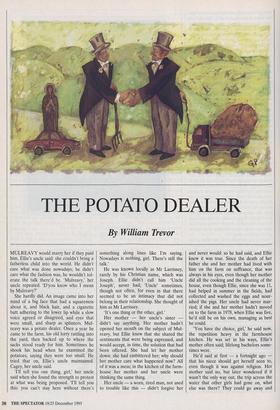
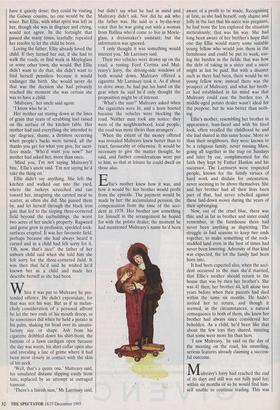
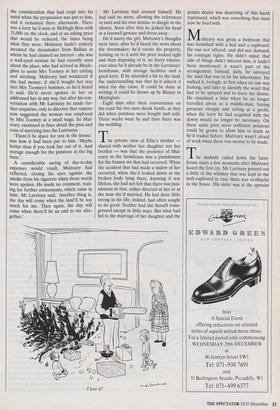
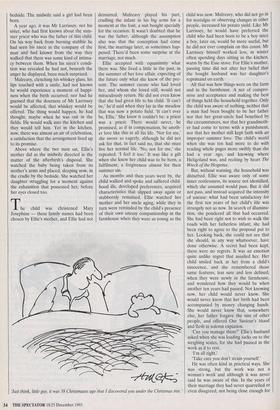
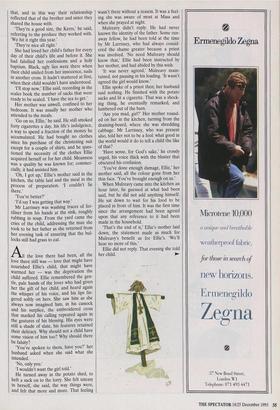
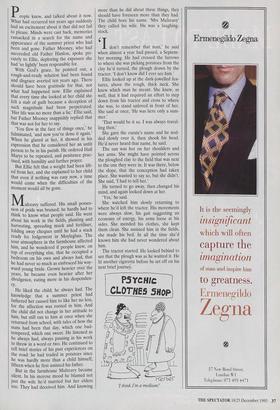








































































































 Previous page
Previous page